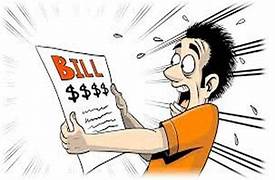At least the educrats in Santa Barbara government schools are honest. They do not intend to educate minorities, the poor and the disabled. In fact, they do not want to educate anyone. Instead just take the money and pretend education is happening.
“”The experience of distance learning has helped us to understand the urgency of adopting a different approach to student grading,” according to a board report. “A student-centered grading policy should honor the rigor of an instructional program, and also recognize the responsibility to hold students harmless from the inherent education inequities, which are exacerbated by pandemic conditions.”
If approved, students could earn an A, B, C, an incomplete, or a no credit.
“No student shall earn a letter grade of D or F,” the report states.
Of course without grades, you do not know if a teacher is doing great or bad. No need for teacher evaluations. When you are asked for higher taxes for schools, remember, education is no longer the purpose of government schools in Santa Barbara.
Santa Barbara Unified School District May Stop Giving Students Ds and Fs
Proposal will be discussed by district trustees on Tuesday, with a vote scheduled for Jan. 12

By Joshua Molina, Noozhawk Staff Writer, 1/4/21
Students in the Santa Barbara Unified School District won’t earn a D or F this school year under a grade-change policy proposed by district officials.
The board of education will discuss the proposal at Tuesday’s 5:30 p.m. meeting, as part of a COVID-19 update.
A report for the grade-changing policy was hidden in the overall COVID-19 board report.
“The experience of distance learning has helped us to understand the urgency of adopting a different approach to student grading,” according to a board report. “A student-centered grading policy should honor the rigor of an instructional program, and also recognize the responsibility to hold students harmless from the inherent education inequities, which are exacerbated by pandemic conditions.”
If approved, students could earn an A, B, C, an incomplete, or a no credit.
“No student shall earn a letter grade of D or F,” the report states.
A student who takes an incomplete will have until June 2 to perform “specific learning tasks,” which would convert the incomplete to an A, B or C.
When a mark of no credit is issued, the board report states there must be documentation of consultation between the teacher and parent, to determine a plan for “recovering learning,” by Jan. 29.
“When in-person learning resumes, we will re-vist the grading policy,” the report states.
Karen McBride, president of the Santa Barbara Teachers Association, read about the proposal in the agenda report, and said that no one “said a word” to the union.
“We have lots of questions and lots of concerns for both the teaching and learning conditions going forward, based on this grading policy,” McBride said. “If this is going to be done, it needs to be done in a way that supports both the learners and educators, and it needs to include timely and meaningful input from the stakeholders.”
The board will introduce the proposal on Tuesday, and is scheduled to vote on it on Jan. 12.
The change comes amid the release of data that show roughly a third of secondary students are earning a D or F in at least one class, and that there is an increase in the number of students earning a D or F in three or more classes.
In addition, rates of Ds and Fs are disproportionately high among Latinx students, students with disabilities, socio-economically disadvantaged students, and emergent multilingual learners, according to the board report.
A similar trend is playing out in elementary schools, according to the district, with roughly a third of elementary students earning a 1 or 2 in reading, writing and/or math.
There has been 10% increase in the number of students earning a 1 or 2 compared to prior years.
As a remedy, teachers will have to give mid-point notifications to parents of students who are in jeopardy of not meeting standard proficiency in a core academic area on a report card.
Teachers also must provide parents an opportunity to discuss specific areas of concerns, and extended opportunities for students to achieve proficiency.
Before any teacher can issue a 1 or a 2, teachers must provide multiple intervention opportunities to meet standard proficiency in core academic areas.
The change would go into effect in the second trimester.
Board President Kate Ford said traditional grading practices contain inequities.
“The proposed policies up for consideration by the board acknowledge the burdens and barriers of distance learning, and attempt to address our responsibility to hold students harmless for conditions that are so often beyond their control,” Ford said.
“They also set expectations for educators regarding interventions, parent communication, and following up/supporting students.”
Ford said distance learning has changed the way that teachers teach, so “it makes perfect sense that it must also change the way that teachers assign grades.”
“The proposed policies reflect, to me, an acknowledgement that assessing learning has needed a major overhaul for a while now,” Ford said. “In particular, we know that grading must be about mastery of information and skills, and not about class participation, homework, behavior, and attitude.
Additionally, we must find better, more meaningful ways to motivate students to learn, ways that go beyond grading that rewards or punishes.”



